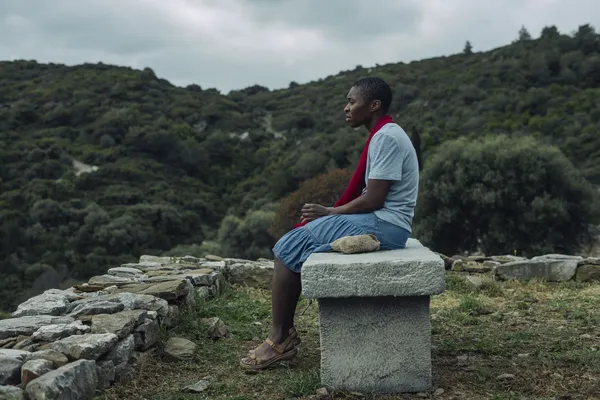 |
| Cynthia Erivo in Drift |
Singaporean director Anthony Chen’s fourth feature, Drift, continues his interest in the archetypal ‘outsider.’ The story centres on Jacqueline (Cynthia Erivo), a young refugee who arrives on a Greek island. She’s trying not only to survive her present but to confront her past. When she strikes up an unexpected friendship with tour-guide Callie (Alia Shawkat), the pair help one another look to the future.
In conversation with Eye For Film, Chen discussed the rejuvenating presence of cinema, his decision to take a leap of faith, and being open to divine intervention.
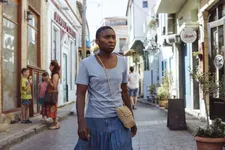 |
| Drift |
Paul Risker: Why film as a means of creative expression? Was there an inspirational or defining moment?
Anthony Chen: All I know is cinema is so connected to my life that I can't see myself doing anything else. Every time I'm feeling down, every time I'm struggling, or I've lost faith in what I do, it’s cinema that rejuvenates me. I guess that's the reason why I'm still doing what I'm doing. I’m constantly reinvigorated and inspired.
I'd been feeling down in the past couple of months, and I was at an impasse and instead of discovering new films that were out at a festival, having done the press and whatever screenings of mine I needed to go to, I spent a whole day watching 1960s Polish black and white films. I was astounded by how visceral, free and original they were. I wish I'd discovered these earlier. I just felt alive again and that's the power of film and cinema for me.
PR: So, making films gives you that lift?
AC: I think so, but it’s not just making films, it's watching films. You're constantly surprised how much it reminds you of our common humanity. Some of the simplest stories can have a deep and profound impact on your life, and that for me is also the essence of cinema.
PR: What compelled you to make Drift, and why now?
AC: I was introduced to the American writer, Alexander Maksik’s novel A Marker To Measure Drift. I read it and was so moved by the character of Jacqueline, but at the same time it was very haunting. It stayed with me for days.
At first, I wasn't sure because my first few films were set in Asia, and they were predominantly in Mandarin. This story was far removed from my upbringing, my background, and my culture, but it's the first time in a long time that I felt such an honest earthiness to a character. There was a sudden roundedness and I felt compelled to tell this story. I thought, ‘Okay, I'm going to take this leap of faith.’
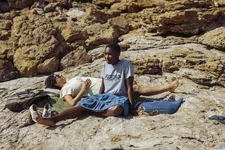 |
| Drift |
When I look back at my work, there’s a recurring motif in which is it's always about the outsider. It’s about people that are finding a sense of identity. I realised that perhaps I'm this outsider who is constantly adrift and pondering the question of where I am and what I am about?
I grew up in Singapore and I've travelled a lot. I've lived in the UK for many years. In a way I've managed to build a lot of relationships and friendships within a community and in the industry, but whenever I travel back home to Singapore, I feel like a stranger going back home. I feel like I'm constantly trying to reconcile that question of who I am, which is why I'm drawn to stories about displacement and outsiders.
PR: It’s interesting how often films that can appear distant from our own culture can have a universal voice. Perhaps this an example of cinema functioning as an ‘empathy machine.’
AC: I completely agree and I think it's very deep and complex. The unlikely friendship between Jacqueline and Callie in this film is precious. Oddly enough, like I've said, I've always made films about outsiders, but all my films tend to be about relationships and bonds formed between complete strangers. In my first film [Ilo Ilo], it was a relationship between a ten-year-old boy and a Filipino maid that was looking after him. In my second film [Wet Season], it was a 16-year-old student and a middle-aged Chinese teacher that form an unlikely bond and friendship. In the same year, I made another film [The Breaking Ice] in China about three young people who bond over a weekend.
I've come to realise that sometimes the people that may come to understand you the most may not be your family or your closest friend. Sometimes it takes another stranger, who perhaps deep inside has similar wounds or fractures, and they can relate and connect with some of the pain and melancholy that you have experienced in life.
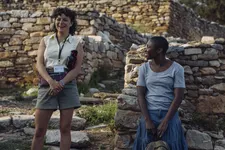 |
| Drift |
PR: How do you use the cinematic language to convey this to the audience?
AC: As a filmmaker, I always set out to capture emotion. I think there are filmmakers that are constantly thinking about plot. ‘I need to get this dialogue; I need to get this scene; I need to get this bit of story.’ It's not so much about that for me. Whether it's a close up of a face, in this case Jacqueline or a shot of the great ruins, or a cutaway of the rustling leaves, for me it's always about capturing the emotion.
A huge part of this film's language is about capturing not just Jacqueline's journey and her as a person, it's about capturing her relationship with the island. There’s a detachment and displacement happening. If you look at the mise-en-scène and how I'm trying to capture that, you’ll see this island becomes a character.
The more I make films, the more I feel it's not just about people, but the spaces have emotion as well. I almost feel that the archeological site of the Greek ruins have captured the wounds and scars of history. A lot of times when you're there you can feel it. I'm not sure if I'm being abstract here, but I feel that's what I'm doing.
In capturing the tension between Jacqueline and the space she's in, we are really capturing this sense of drifting and displacement. It’s this sense that she's not standing on solid ground.
PR: Do actors reveal things about the characters that surprise you and introduce them as if you were encountering them for the first time?
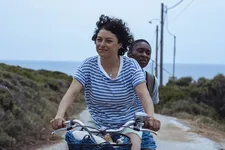 |
| Drift |
AC: Interestingly, Jacqueline is initially front and centre, and Cynthia has owned the character from day one. It’s fascinating to watch on set how she navigates this character and the decisions that she makes. There are moments where I might have an image in my head, or I have a feeling of what I want to capture, and I’d say, "Why don't you try this.” When we've got it, she might come back and say, “I want to try something else.” She would instinctively play with the space or do something else, and oddly enough, that might end up being in the film.
I'm becoming a firm believer that 70% of the film comes from the hard work, the preparations and the planning, but you need to leave 30% for the bits of divine intervention. You need to let the actors feel their feet on their ground, let the weather, let the sound, let the space take over. You need to not just open your mind but open your heart to feel it. When you see it, you need to capture it because that's when it's real – that’s when a scene is alive.
Drift releases theatrically in the UK on March 29th 2024.





















